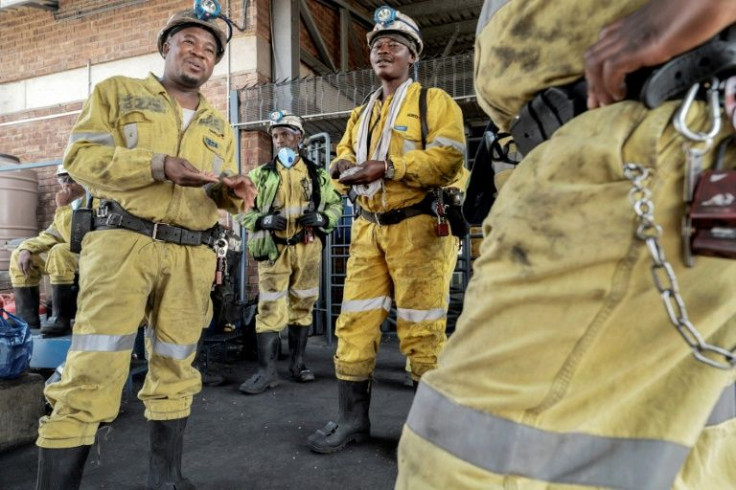South Africa Does Not Want Mines To Undermine Its Economy

Rich mineral reserves, the principal reason behind the colonization of South Africa, have been one of the central economic questions in Africa's second-largest economy.
The allure of the country for investors has been its deepest mines -- responsible for 60 percent of the global manganese supply, 75 percent of the platinum supply and 40 percent of the palladium supply. The country also churns out nickel, cobalt, silver, beryllium, vanadium, titanium and rare earth elements besides the ubiquitous coal and gold.
According to the International Council on Mining and Metals, an industry group, mines in South Africa are outperforming as they are among the most dangerous in the world, while the global mining industry is making strides in its transition towards renewable energy and a sustainable economy.
According to government data, mining production fell by 4.5 percent year-on-year after a drop of 6.4 percent the previous month. The decline in mining output has been plaguing its economy for eight months this year as mining is of paramount importance- accounting for 8.7 percent of GDP and more 460 000 jobs.
Iron ore and gold reported the largest negative growth this year with a fall of 23.1 percent and 12.4 percent, respectively.
This happened as the mining industry, a major source of foreign exchange and jobs in South Africa, is trying to put up with the consecutive decreases reported between February 2020 and February 2021 when the 60.6 million nation passed through a worse period due to Covid-19 pandemic.
Illegal mining, rampant corruption, extortion and violence linked to the extraction of diamonds, coal, gold and chromite are costing the industry billions each year. In a way, the organized crime syndicate has managed to create an existential threat for investors.
"We are bearing the brunt," said Roger Baxter, CEO of the Minerals Council South Africa, an industry group in South Africa, on Nov 23 at a workshop in Sandton.
To curb crime, in a policy report released this March, the Department of Mineral Resources and Energy announced its intention to set up a new task force to combat illegal mining. But that alone will not save the industry.
South Africa has many of the deepest mines in the world. But they are historically poor in safety. There was an 18 percent hike in freak mishaps in 2020.
Falls of ground, or FOGs, have long been the main culprit for accidental deaths in mines in South Africa. According to the Minerals Council of South Africa, more than one million people have suffered grave injuries since the industry became active in the country.
However, intensified regulatory scrutiny, labor activism, and investor pressure are putting pressure on the government to make them safer. Statistics show a sharp drop in FOG fatalities these days with the use of new technologies, like sophisticated radars that can detect falls of the ground before they even occur.
A lack of innovation, tardy infrastructure, unreliable electricity, and social unrest are blamed for the damage caused by the underperforming mining industry.
In early 2021, the Minerals Council South Africa published a report which called for technological innovation to transform and improve operations.
Under an amendment to South Africa's Electricity Regulation Act, on Oct. 5, 2021, mining companies are now in a position to buy renewable energy from independent power producers to tide over the high rate and unreliability of state-run power producers.
Some of the biggest mining companies plan to achieve net-zero carbon emissions by 2050. They are keen on following the climate-related financial risks laid out by the G20's Task Force on Climate-related Financial Disclosures (TCFD).
South Africa will continue to mine minerals for the foreseeable future and the industry is gearing up to make the operations sustainable by adopting environmentally and socially responsible practices. The transition to renewable energy is tied to the country's carbon emission targets.
The country is also mulling using advanced robotics and a different method of extracting ore, bringing a new perspective to the industry and pushing the digitalization and automation narrative. Currently, the country uses a lot of mining tools that already possess built-in intelligence.
A few diamond mines are doing extremely well with digitalization and are waiting on their wings to start autonomous mining in the country.
To get more money to promote responsible exploration, South Africa is seeking the help of advanced nations like the UK. In a new joint venture, the UK will chip in with technology to produce minerals as part of the global clean energy transition."
On Nov. 22, at the start of President Ramaphosa's visit, The UK and South Africa decided to start the next phase of the UK-South Africa Infrastructure Partnership which was announced by Prime Minister Rishi Sunak.
But, the use of these technologies is heavily dependent on the availability of connectivity in the country where South Africa is lagging on many fronts.
But increasing digitalization, automation and the use of drones to get rid of employees can result in social unrest in the post-extractivist systems of its political economy, if not done properly.





